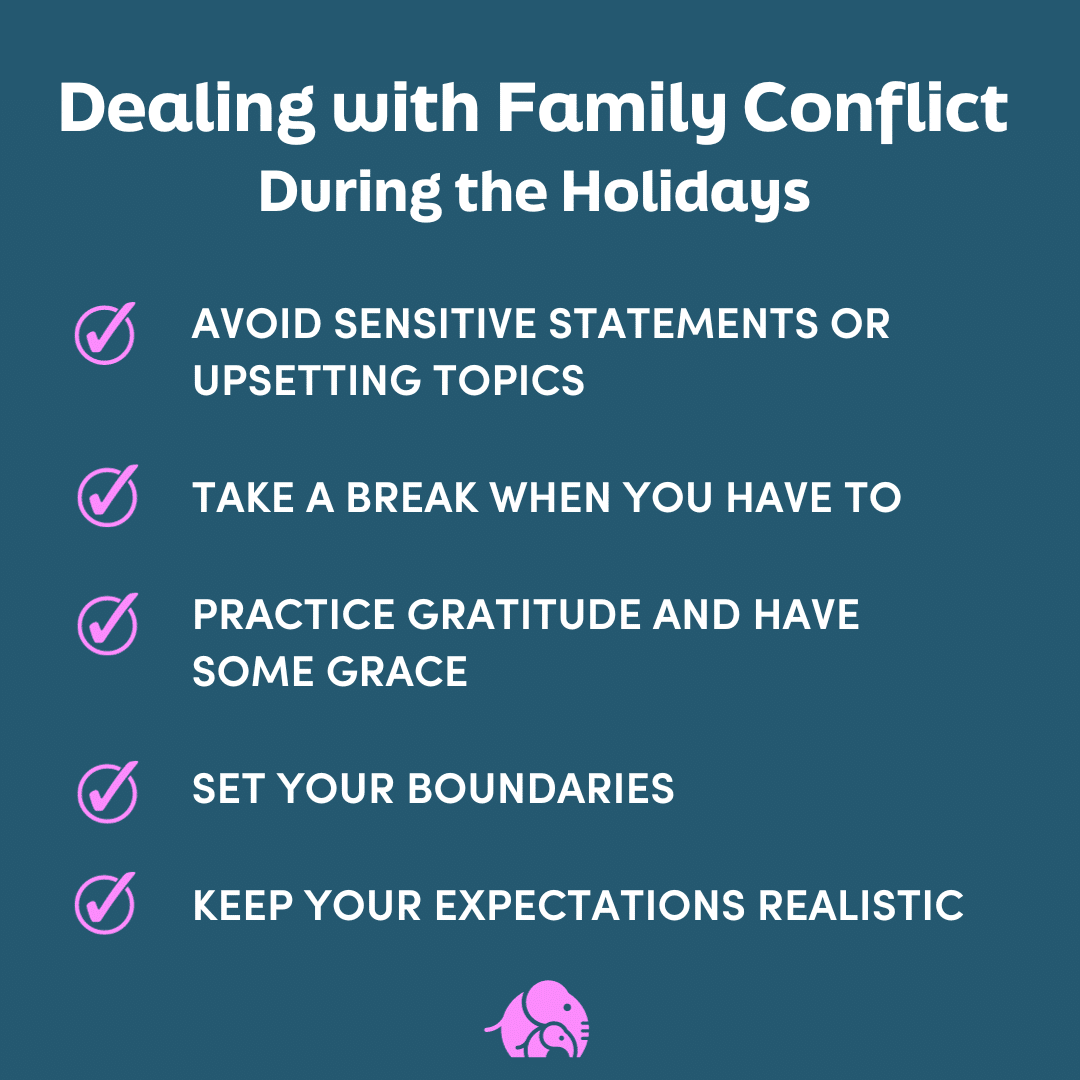So, you’re ready to get in the festive spirit and celebrate the holidays with your family, right? While this is often a time for joy and cheer, sometimes family conflict can overshadow the occasion and make everyone miserable. But the good news is, family conflict doesn’t have to be the defining moment of the holiday season.
Sure, everyone loves Uncle Steve and Aunt Marlene. But when they get to talking about politics and conspiracy theories, it riles the entire group into a shouting match. And it certainly doesn’t help that Aunt Marlene thinks the earth is hollow and full of lizard people.
Thankfully there are several ways to deal with family conflict during the holidays. – and even to deal with good ole Aunt Marlene. In the following, we’ll explore how to deal with family conflict during the holiday season.
Having trouble dealing with family conflict during the holidays? Reach out to Ellie Mental Health today and talk with an expert.
Setting Boundaries
Let’s face it. Not every family is going to get along every time they gather together. Some people have light triggers. And the fact is, some family members are just like oil and water – or probably more like gasoline and a match. This is why it’s important to set boundaries and agree on a few particulars before gathering together.
For example, if you already know that your family is divided politically or religiously, it’s best to avoid talking about these subjects while together. See if you can get everyone to enter a truce, or simply agree to keep politics and religion off of the table during the holidays.
In addition, you may have personal boundaries that you need to set for yourself. Perhaps you’re accustomed to being quizzed about your life every time you gather for the holidays. But remember, not every question is a “loaded question.” Assuming that every question is an interrogation leads to anxiety and stress, and can have you jumping down someone’s throat for no reason at all.
For example, maybe when your mother asks how college is going, it probably doesn’t mean she wishes you would change your major and not end up as a starving artist. Perhaps she’s really asking to see if you’re doing ok.
The key takeaway here is to not jump to any conclusions, and if talking about your personal life is off-limits for you, let that be known upfront.
Keep Your Expectations Realistic

Some people simply won’t change. After all, why do you think Aunt Tina never likes your hair and always has something to say about it? If you already know that some of your relatives have behaved the same way for years, it’s best to prepare for this instead of hoping for it to be different.
When dealing with “difficult” relatives, consider the following:
- Keep your distance
- Say hello and be polite
- Try to direct the conversation
- Have a story already planned to tell
- Change the subject if you feel uncomfortable
Uncle Billy may love to tell the story every year about when you destroyed the Christmas tree when you were two years old. By expecting this to happen, you’ll be better prepared to roll your eyes, walk away, and tell an embarrassing story about him later on. Just a thought!
Avoid Sensitive Statements or Upsetting Topics
As mentioned, politics and religion have a way of igniting turmoil in any gathering. The fact is, these beliefs are personal and not everyone is going to agree on them. And someone seriously needs to tell Aunt Marlene that the lizard people are actually shape-shifting robots. But beyond politics and religion, there are other topics that should also be avoided.
A few additional subjects that should probably be avoided may include:
- Asking “when” someone is going to have children
- Talking about someone’s parenting skills
- Asking “when” someone is going to get married
- Asking about personal issues (divorce, medical problems, school progress, etc.)
- Talking about environmental issues (this can get political)
No matter how badly you want to tell your cousin that she would “make a great mom,” this may be a sensitive subject for her. For example, perhaps she’s tried to get pregnant for a while and is experiencing complications. Above all, be aware of the conversations you enter into, and be cognizant of others’ feelings before you speak your mind.
Take a Break When You Have To
The great part about gathering for the holidays is that it is entirely optional. Sure, people will miss you if you don’t show up. But if you do decide to show up, you’re not obligated to stick around for every activity.
If you’re feeling anxious because of already ensuing family drama, excuse yourself politely and leave. Or if you’re at home, go take a walk or find a quiet place to sit and be comfortable. If you’re in town for a few days, head back to the hotel or go see an old friend. Options to avoid any family conflict will be available. It’s up to you to know when to break away and get some space.
Additionally, it’s always a good option to keep company with those in your family who are usually drama free. Maybe your cousin Brantley is completely drama free and loves to talk about tropical fish for some reason. And even though you’ve always found it boring yet strangely interesting, by hanging with him for a bit, at least you’ll be safe from the conflict – and you might even learn a thing or two about South American Pacu!
Practice Gratitude and Have Some Grace
Next time you’re at a family gathering, just look around and take it all in. While some family members may be genuinely toxic and difficult to be around, it’s good practice to check in with yourself and dig deeper into why you don’t want to tolerate certain family members. Could you have underlying resentment you haven’t processed? Are there passive aggressive or lingering conflicts you need to talk out? Are you being judgmental or making assumptions without giving your family member a chance?
While it can be easy to get into a pattern of focusing on the negative, annoying, or unkind things your family does, take time to consider the positive aspects you appreciate about them. Yes, your mom might still lecture you on the smallest things (or big things). But can you recall any happy memories or the times she gave you advice you wish you took?
We’re only here for a short time. And life can change in the blink of an eye. As such, it’s best to be grateful that you have time to share with the special people in your life – and acknowledge their presence as a blessing. You don’t want to leave the holiday season with regrets – especially if you said anything hurtful or spiteful.
When you can come together with family and understand that things change, time moves on, and some people will be left behind, it brings you closer to cultivating gratitude for everyone in your family, no matter how batty or ridiculous they can be at times.
Remember that everyone has feelings. Everyone deals with life differently and has their own quirks and idiosyncrasies. Words are expensive. Once you use them, you can’t take them back as easily.
At the end of the day, the best way to deal with conflict during the holidays is to meet everyone with loving-kindness and set boundaries with the intention to cultivate a healthy holiday season – not out of spite. Be the candle in a dimly lit room. Become the smile that everyone wants to be met with. And put away any issues from the years before for a few hours. It really can be this simple.
Can’t figure out how to deal with family conflict during the holidays? Reach out to Ellie Mental Health today and talk with an expert.


